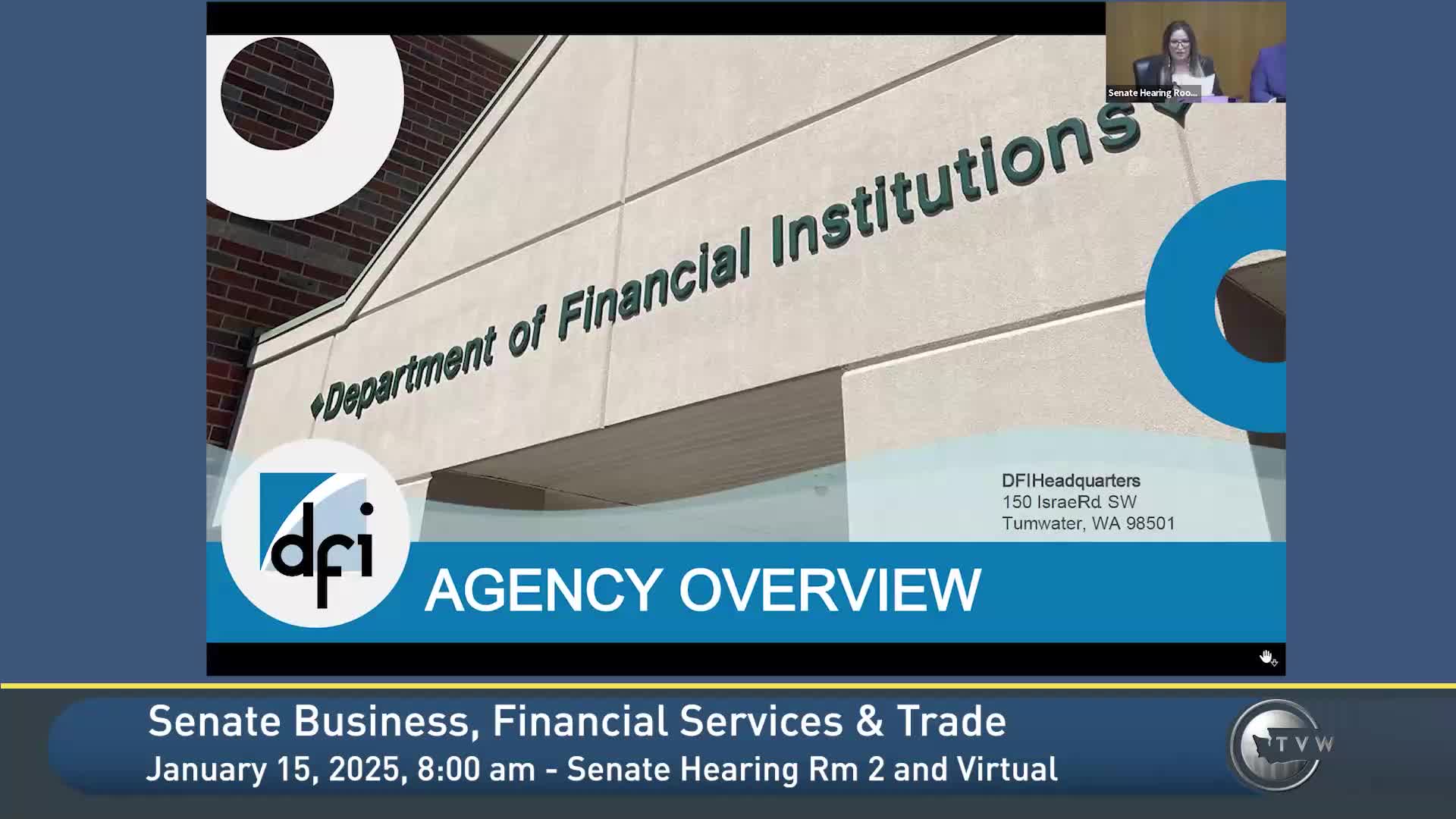Department of Financial Institutions outlines supervision priorities, proposes virtual-currency kiosk bill
Get AI-powered insights, summaries, and transcripts
Subscribe
Summary
The Department of Financial Institutions briefed the Senate Businesses, Financial Services and Trade Committee on agency priorities including cybersecurity, supervision of third‑party service providers, enforcement activity, and planned legislation on virtual‑currency kiosks and a technical fix to Washington Saves administration.
Charlie Clark, director of the Washington State Department of Financial Institutions, told the Senate Businesses, Financial Services and Trade Committee that the agency’s mission is "to protect consumers and to advance the financial health of Washington State by providing fair regulation of financial services and educating consumers to make informed financial decisions." He and division directors reviewed supervision, enforcement and outreach work and outlined bills the agency will seek this session.
The agency emphasized consumer protection and coordination with state and federal partners. Clark said the agency licenses and examines institutions, takes consumer complaints and pursues enforcement where violations are found. "The first layer of consumer protection is when we license, register, or charter new institutions," he said, and added that the agency coordinates with other states and federal regulators where companies operate across jurisdictions.
DFI explained why cybersecurity, third‑party service providers and nonbank mortgage servicing have been central recent priorities. Roberta Hollinshead, director of the Division of Banks, said Washington’s chartered banking sector has consolidated and become more complex and that the division has expanded technical examination capacity to address cybersecurity and service‑provider risk. "We have developed and deployed industry tools to monitor for cybersecurity risks," Hollinshead said.
Amy Hunter, director of the Credit Unions Division, said Washington has 48 state‑chartered credit unions, ranging from the smallest at about $22 million in assets to the largest, BECU, at roughly $30 billion. She also described the composition of credit‑union lending: mortgages (about 38% of loans), vehicle lending (about 26%), commercial loans (about 18%) and unsecured loans (about 9%).
Ollie Higgs, director of Consumer Services, described the non‑bank supervision portfolio — money transmitters (including virtual currency), mortgage brokers and originators, check cashers and payday lenders — and highlighted multistate work. Higgs said DFI led or participated in three major multistate enforcement actions in 2024, including a multistate settlement related to mortgage servicing and an action against an unlicensed virtual‑currency business. The division said it also regulates virtual‑currency kiosks and issued a policy statement on kiosk operators last year that increased disclosure requirements.
Drew Bouton, DFI policy counsel, summarized the agency’s pending legal and policy work on home‑equity‑sharing agreements. Bouton said a case addressing whether these contracts are mortgages was argued in federal court and that DFI filed an amicus brief urging the court to treat such agreements secured by a deed of trust as mortgages because doing so would make applicable mortgage protections and disclosure rules.
Bill Beatty, director of the Securities Division, told the committee that investor fraud schemes, often tied to cryptocurrency and romance‑scam recruitment, remain a critical enforcement focus. Beatty described investor alerts the division issues to warn consumers of emerging scams and said criminal prosecutions are rare but occur when investigators can show theft beyond civil violations.
On legislation, Clark said DFI will sponsor a virtual‑currency kiosk bill to address kiosk disclosures and the machines’ use in scams, and a technical correction to the Washington Saves (state automatic IRA) authorizing language to reflect that DFI, rather than the state treasurer, will provide administrative support for the program. Clark also said DFI was asked to provide administrative support to the Covenant Homeownership Program Oversight Committee and to the Washington Saves board.
Committee members asked about consumer complaint handling for mortgage servicing and for court‑ordered transfers of property following divorce or domestic‑violence orders. Clark and division directors said DFI can accept complaints about servicers and will assist in opening lines of communication, but they also noted limits where institutions are federally chartered or where jurisdiction and ownership records complicate servicer recognition of a court order.
The agency provided several quantitative details: DFI reported roughly 237 full‑time staff; the state’s trust assets under supervised trust companies were described as just over $60 billion; the Division of Banks reported regulated banking assets just above $103 billion; the Credit Unions Division reported about $85.5 billion in total credit‑union assets with BECU at about $30 billion and the smallest state credit union about $22 million. Committee testimony described the nonbank money‑transmission and servicing market as large but did not provide a verified statewide aggregate figure for that sector.
DFI directors described next steps for the committee: committee staff can expect draft language for the virtual‑currency kiosk bill and the Washington Saves technical fix; the agency will continue multistate enforcement coordination; and DFI invited legislators to refer constituent complaints about licensees to the agency for investigation.
While the meeting was informational and no formal committee action was taken, DFI directors identified legislation they will seek, ongoing enforcement efforts and areas where additional statutory clarification (for example, on home‑equity‑sharing agreements) depends on court rulings or new law.
Votes at a glance: none — this session was a work session and no formal committee votes or motions were recorded.
